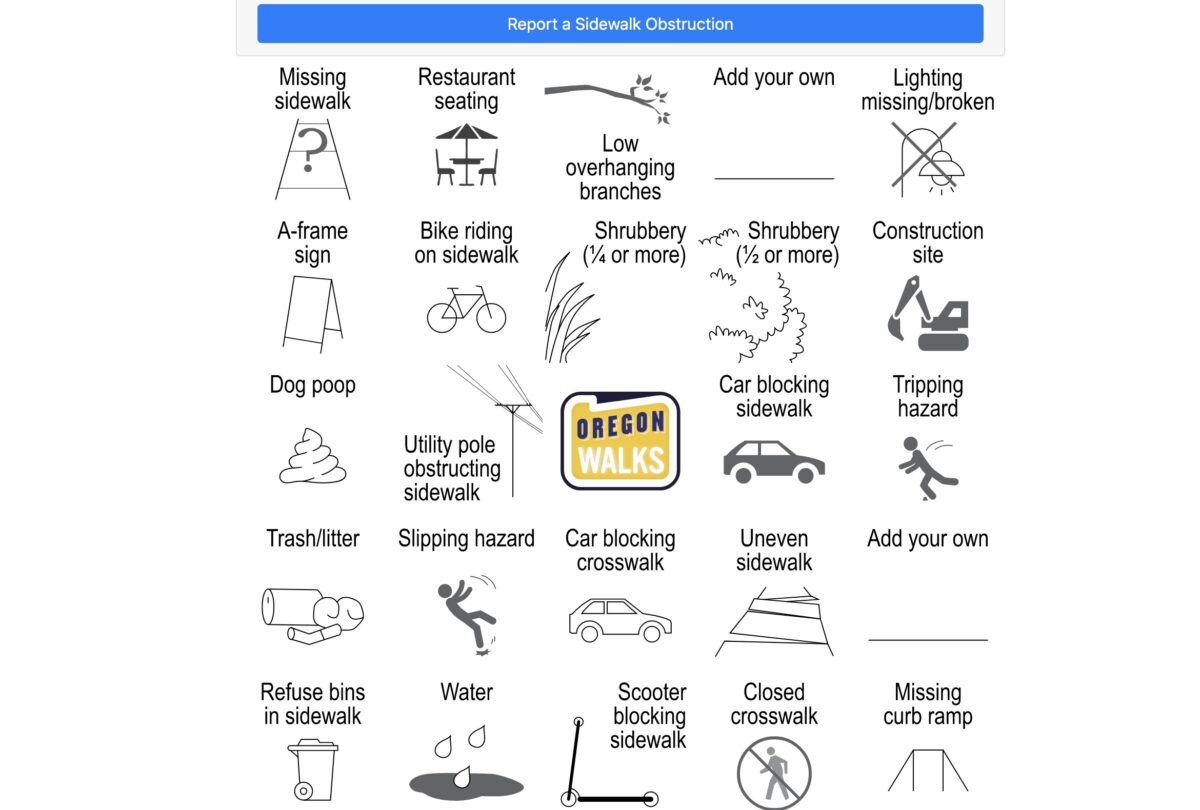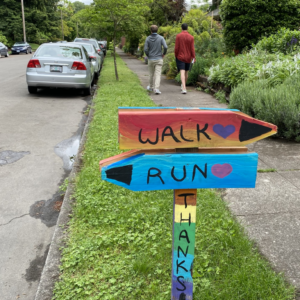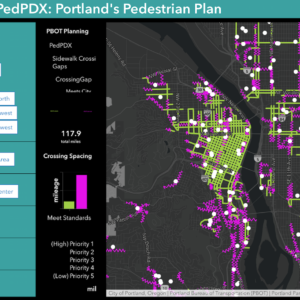
Sidewalk obstructions are to walkers what bike lane blockages are to bike riders. That is, always annoying and often downright dangerous.
Portland nonprofit advocacy group Oregon Walks has a new tool that to report these hazards. And they’ve turned it into a game.
Sidewalk Obstruction Bingo, a website that also works great on mobile devices, comes with 24 squares labeled with some of the most common things that get in your way including: low branches, cars, garbage bins, a-frame signs, trash, work zones, and so on. There are even squares for missing lights and sidewalk gaps. (I was a bit disappointed to see that they included “Bike riding on sidewalk,” because that’s legal (except for a section of downtown) and often necessary for many people.)
Advertisement
To play the game all you do is click the icon on the board that matches the hazard you face and share the location details with Oregon Walks. Once you get a bingo you can be entered into a prize drawing.
This is an interesting idea and seems like a great way to collect information about hazard hot-spots. Check it out here.
— Jonathan Maus: (503) 706-8804, @jonathan_maus on Twitter and jonathan@bikeportland.org
— Get our headlines delivered to your inbox.
— Support this independent community media outlet with a one-time contribution or monthly subscription.







Thanks for reading.
BikePortland has served this community with independent community journalism since 2005. We rely on subscriptions from readers like you to survive. Your financial support is vital in keeping this valuable resource alive and well.
Please subscribe today to strengthen and expand our work.
This will be a great tool for community walk audits.
Add your own ideas: Tent and human unconscious from drug/ alcohol abuse.
Of course I would like to see them change this to just ‘Sidewalk Bingo’ and add:
Children’s chalk art, Maintained vegetation, Driveway meeting current design standards, Proper vision clearance triangle, ADA ramp inline with path of travel, Attractive front yard flowers, Smooth and even concrete, Intersection Repair art, Attractive paving pattern, Waving and smiling neighbor, etc.
Plum tree with ripe fruit.
Home that has put up “You have now entered the jurisdiction of the Ministry of Silly Walks. Commence silly walking immediately” signage.
Need to add “pile of cannibalized bike frames”
“Human poop”
Water.
Been noticing a lotta dog poop on the sidewalks these days.
I would add “pedestrian (stationary or moving) entrance by phone”
tent
Need to add bikes locked to poorly-situated staple racks on sidewalk.
I have mixed feelings about tools that encourage complaints about poorly-enforced regulations.
Sidewalks ought to be usable (although they are a public resource and should be maintained with public funds, not have that burden foisted upon the nearest private party). But just like in homeowner’s associations, invariably some small number of people will use their new-found power of complaint to brow-beat those they dislike with a fusillade of only-enforced-when-someone-complained infractions. Also, by inserting extra parties into the process, communication is lost and the whole process becomes more hostile. Instead of one person saying to another, “hey, do you think you could fix this?” and a chance to say, “yeah” or “I’d love to but…” now it’s some anonymous party leveraging the power of government to compel action without any chance of dialogue.
Imagine you have a sidewalk over your property. Lots of people walk by your sidewalk every day, and to your frustration more than a few leave their pet’s droppings in your yard. Still, nobody’s ever complained to you. Your grumpy neighbor discovers a whole bingo-app worth of complaints they can use against you, and one day a police officer knocks on your door and hands you a ticket to trim tree branches within 10 days or get fined plus have to pay the city’s cost to do it for you. Cue a mad scramble and taking some time off work to deal with the issue and avoid a fine. About a week later, the police officer shows up with another ticket demanding you remove dog poop from the sidewalk, again within 10 days or fine. Annoying, but quickly addressed. Ten days later, when the police visit within minutes of another person’s dog pooping in your yard while you weren’t home, you get tagged with a fine. A week later, the police show up again, this time with a ticket about some weeds and shrubbery. About two weeks later, it’s the police again giving you 10 days to fix an uneven step in the sidewalk. Good luck getting someone to repair a sidewalk within 10 days.
This, except for the app, is a true story, by the way. But it’s easy to see the role that a laundry-list of infractions with one-click complaint functionality could play in enabling this kind of behavior. And that, I don’t like.
Wow, that person in your story does a poor job of upkeeping their sidewalk.
I have all those problems with the sidewalk in front of my house. I take care of the issues so I haven’t had any complaints. I’m the only one on the block that clears their sidewalk (as you’re legally required to) when it snows.
When you walk a lot you realize that all those problems are a major hassle for a space that’s supposed to be freely enjoyed by all. I don’t think you want to pay the taxes for the city to go around and audit everybody’s public easement for violations. They rely on us to point out these violations. There’s no way I’m going to out myself to an angry neighbor who doesn’t trim their bushes and forces me to walk in the muddy planting strip.
The problem isn’t with the people complaining, it’s with the homeowners not maintaining their public portion of the city. Be a good neighbor or get reported. Don’t fix it and risk a lawsuit when somebody hurts themselves.
Unfortunately you have a point. I prefer the direct, talk-to-the-neighbor method. But if they don’t fix it, then I can’t report it without them assuming it’s me, and when they get their violation notice they sometimes retaliate, which can be costly and even dangerous. If you just go straight to reporting, you avoid that.
If you’re so afraid of your neighbors that you can’t even talk to them, then I guess I’m glad I don’t live in your neighborhood.
I get along with the vast majority of my neighbors, and am not “afraid” of any of them. However, I’ve had a few experiences with past neighbors that were bad, and in different neighborhoods, and I also know other people who’ve had similar bad experiences. I also get asked by other people to help them resolve problems with neighbors (often the City) so see way more of these situations than just my own.
The situations I’m talking about are not the routine, “Can you tell your dog to stop barking” issues. The last one was with a commercial neighbor, and may have cost them several hundred thousand dollars. I had to call 911 for protection on that one. The other one involved an illegal airbnb. That one also cost its owner at least tens of thousands of dollars. He tried various retaliations until he gave up and sold the property.
I’ve helped people with meth labs and squatters in homes in their neighborhoods. Is it wise to first personally ask meth cookers to move out before contacting the City? I don’t think so. Again, I’m not talking about loud radios or barking dogs, and I’m not saying retaliation is common, but it is something to consider before confronting some people.
Yeah, I was still imagining “sidewalk isn’t clear” situations. “There’s a meth lab next door” is a whole different kind of concern, agreed.
Yes, and I agree with most everything else you’ve said here.
Ironically, one of the strongest reactions I ever got to complaining was when a joint PBOT/Water Bureau project parked a dump truck in a sidewalk for half an hour or so, forcing people to walk blindly into oncoming traffic on a highway, with no flaggers or other aid. When I complained, saying “Hey, this is really dangerous!” to the Water Bureau onsite foreman, he told me to call the office on Monday, as the PBOT foreman looked on. When I told him that doesn’t stop the current danger, the contractor told me he was calling 911 to have me arrested for “jobsite interference”.
I’m certain that legal shortcomings can be found in any stretch of sidewalk you pick, including yours. I think Jonathan has written about sidewalks repaired by the city the prior day failing the 0.5″ gap spec. Did you get the required permits and inspections the last time you maintained the drain or path? Sidewalks can be perfectly usable and still fail legal muster. That’s not the point I’m trying to make. No amount of homeowner maintenance will make you immune from complaint-driven, government-assisted harassment by someone who wants to be a thorn in your side. It’s that much more poignant if you become a repeat target while six feet away identical and worse violations are completely ignored.
So yes, if unrealistic sidewalk policy is here to stay, then I do want the city to go around and audit everything. If it’s a major hassle for pedestrian mobility when branches are 7′ overhead instead of 8′, when the scoring pattern is off by a bit, or when the the planting strip isn’t green enough, then allocate the funds to fix it. I’d rather spend tax money on making the pedestrian experience usable than, say, adding closed-circuit TV cameras, extra car lanes, or any number of other projects that do get funded. And not just to audit, why not *fix* the issues instead? Take the complaints from this app and turn them into a maintenance task list, and I’ll be happy. Take the complaints from this app and turn them into tickets and fines, and I’d rather not have the app at all.
I’ve been told that when the city responds to a complaint, the inspector canvases the entire area for issues, so the “ignored violations 6 feet away” is not really a thing.
Nor is the “parking strip not green enough”, and I doubt many inspectors are citing people for greenery 7ft above the sidewalk (though I assert that without any evidence whatsoever).
I’m fine with the city taking on responsibility for maintaining sidewalks, parking strips, street trees, leaf cleanup, snow shoveling, etc. (which would likely involve higher taxes) — especially if they’ll tend my flower beds — and I’m fine with the current system, where I have greater control over and responsibility for my immediate environment. I’ve never heard of the kinds of nattering complaints you’re talking about, especially those that come with fines rather than a maintenance list. Do you have reason to think it’s anything more than a somewhere between microscopic and non-existent problem?
My experience is not what you’ve described. I wish it were.
Your flower beds are your private property and the public doesn’t have a right to help themselves to them. That’s a big difference to “your” sidewalk, which isn’t really yours at all and whose whole purpose for existence is public use.
My flower beds are on the parking strip, so are in the public right-of-way. I agree that the public shouldn’t be helping themselves, but some do.
It’s not consistent. One inspector told me he has to go into a property “with blinders on” and just focus on the violation he’s there to see. I’ve seen others not only inspect a property, but then do research on past permits to find more potential violations. I’ve seen inspectors park in front of a house that was literally falling down after being abandoned after a flood 20 years before, then go cite someone nearby for excessive leaves on their roof (the reported violation) and not cite the derelict house at all.
Inspectors will say they are required to follow through once a violation is reported, no matter how trivial, and they often will ( including for vegetation over a sidewalk) but they’ll also ignore major ones sometimes, even when reported.
Sidewalk issues are not enforced by the police. It is either by PBOT (structural sidewalk issues) or Development Services (vegetation). I think Parks or the city arborist had a role in vegetation some years ago.
Also, with sidewalk replacement/repair issues you have either 30 or 90 days not 10 days. It’s thirty days if someone fell on the sidewalk; otherwise 90 days to effect the repair.
More often than not, there appears to be no follow-up. When I’ve complained about branches intruding into the sidewalk space, even blocking half the sidewalk width, the homeowner does a little trimming (maybe improving clearance by 6 inches) and the city accepts that as adequate and closes the case.
There are different timelines in different jurisdictions and for different scenarios even within the same jurisdiction. Most things for City of Portland are 60 days, but some things are more or less.
While I do love a good whinge about minor blockages to bike lanes and sidewalks, this bingo game is like Karen/Ken training wheels. “Sir there is water on your sidewalk and it is infringing on my freedumbs and liberties – like to speak to your manager”.
Blocking a sidewalk may seem like a trivial thing, unless you have impaired mobility, in which case it becomes a very big deal. But that’s someone else’s problem, right?
I am curious… do you, as a member of our society, have any right/obligation to try to improve/maintain our commons for the benefit of all? You make it seem as if asking people to fulfill their basic obligations to the rest of us is somehow wrong.
If the duty to care for our public places doesn’t fall on all of us, who does it fall upon?
Usually it falls on the government. Hence taxes and all that. Would you really want a system where each block of a road was built and maintained by a different party? Or where each chunk of grass in the local park was a different person’s responsibility to water, weed, and mow?
I don’t imagine our government will do everything for us; I see the system as a framework for empowering each of us to work toward the common good in the manner we see fit. Sometimes that means collectively hiring people to do things (i.e. government employees), sometimes that means individually doing what we feel needs doing (e.g. neighborhood cleanups). That does place more burden on the conscientious, but then doesn’t everything in life?
(And no, I don’t think your parks example would work (but Sewallcrest Park was, and may still be, tended by volunteers), but, possibly, the streets example could, if it were not so overwhelmingly expensive, and it were built in a more modular fashion allowing different segments to be repaired as needed.)
The glaring omission of tents/campers/piles of stuff blocking the ROW has been pestering me since I saw this post. This City and Nation are grappling with decades of ignoring systemic racism instead of confronting it, and now, it seems to me, we are beginning a new era of ignoring classism. Homelessness is a tragic and complex issue. Previous generations carrot and stick approach has increasingly become a failed system thanks in part to the carrots being dismantled and taken away starting with Reagan and continuing to this day. We have been unable or unwilling to provide enough “carrots” to make up for the shortcomings, so our policy became too stick-heavy. As a City, it seems we reached a turning point under the Hales administration, when he stopped enforcing certain rules about setting up camps illegally. The pendulum has continued to swing in this direction, to the point where more and more laws (camping on sidewalks, unregistered/unlicensed vehicles, open fires, open drug use, etc) are being ignored for one class of people. Some advocates are calling for the normalization of substandard tiny house villages. IMO, this is calling for the creation an officially sanctioned class of people with fewer laws governing them, and fewer protections. Health and safety standards will not apply to this class of people as long as they stay in their shanty town/flavela/ tiny house village.As wrong as I believe this is, and equally great tragedy is that this most impacts the working poor, and people with disabilities who rely on public services. If sidewalks, MUP’s, park and overtaken by groups of “campers” to extent that they are unusable, this will have far less impact on people of means. If you have the money, you can drive where you need to go, or take a Lyft; you can drive to recreation, swimming, dog-walking. If you are strapped for cash and time, you rely on transit, on bike paths and sidewalks. You rely on Parks and the services provided by PP&R for personal and family recreation as well as child care. If you are blind or use a mobility device, having tents block entire block faces creates immense challenges. It has become seen as virtuous to tolerate camps, but that tolerance comes at the expense of vulnerable populations and at the expense of fundamentally changing our understanding of justice with equal protection under the law. We need to do a much better job at providing support to people with mental illness and drug addiction. People need to be offered a secure place to sleep. We also need to re-establish our social contract: our parks need to be clean and safe, our transit needs to be clean and safe, our bike lanes must be safe and well-connected, our sidewalks need to be accessible.
As for this bingo chart, we need to acknowledge that the largest, most common, most dangerous and most sever sidewalk obstruction are the hundred of tent village that we allow there.
The pandemic is proving to be a disaster for the disabled. Over here in Bend, the city is allowing restaurants to partially or completely block sidewalks with tables, chairs, detours into the street etc etc If a blind person has taken months to memorize an urban route, it is now completely turned upside down. The same thing happens in the Winter, when the City piles up snow on the sidewalks; I have actually helped blind and disabled people get through the gauntlets, when I have found them obviously at a loss as to how to proceed. This is after dozens of pedestrians just walk around and ignore them.
There should be bonus points for the vehicle-related violations if the vehicle has a “Share the road” license or sticker. Triple if it’s a City vehicle with a “Vision Zero” bumper sticker.